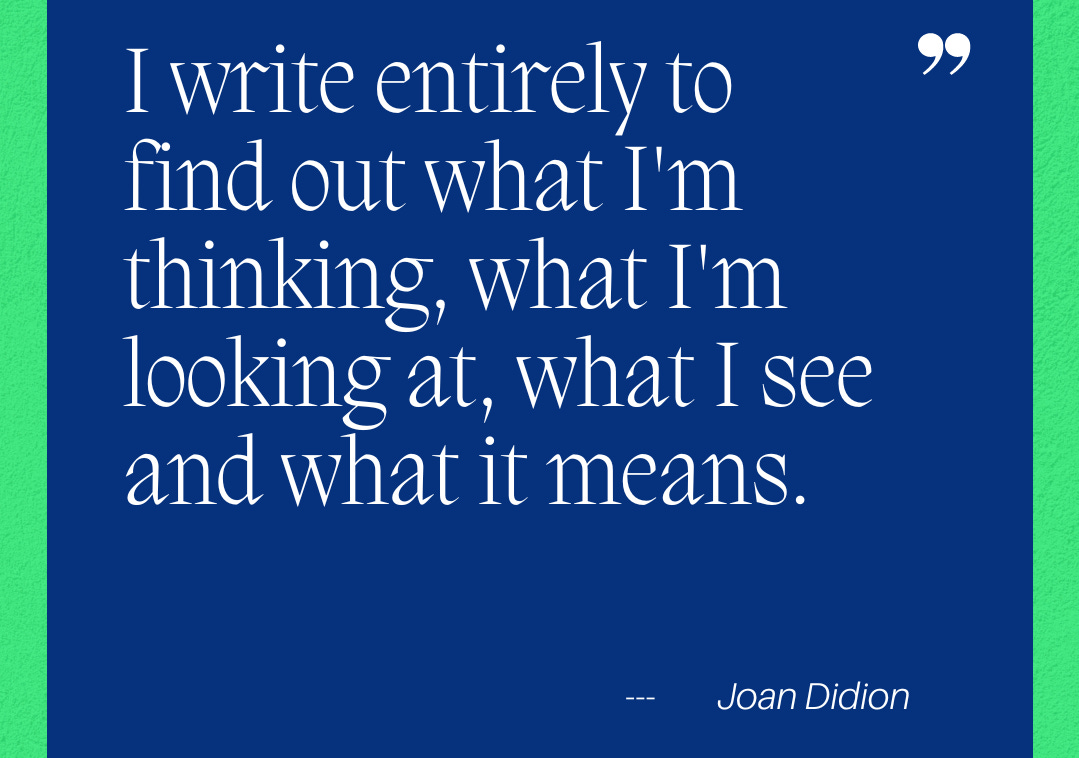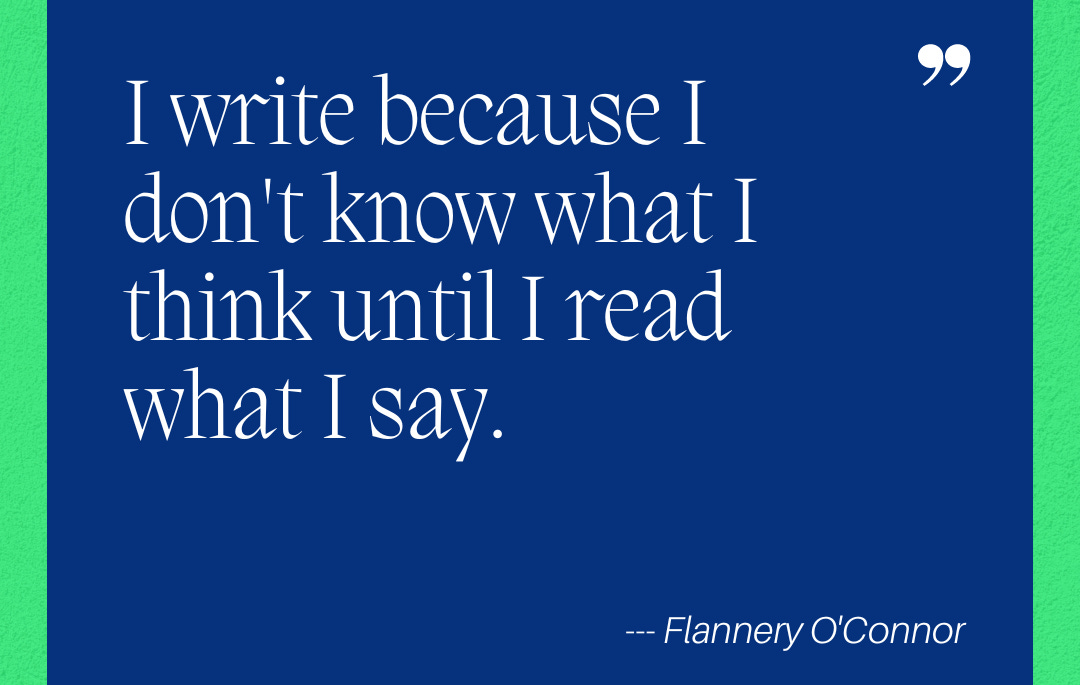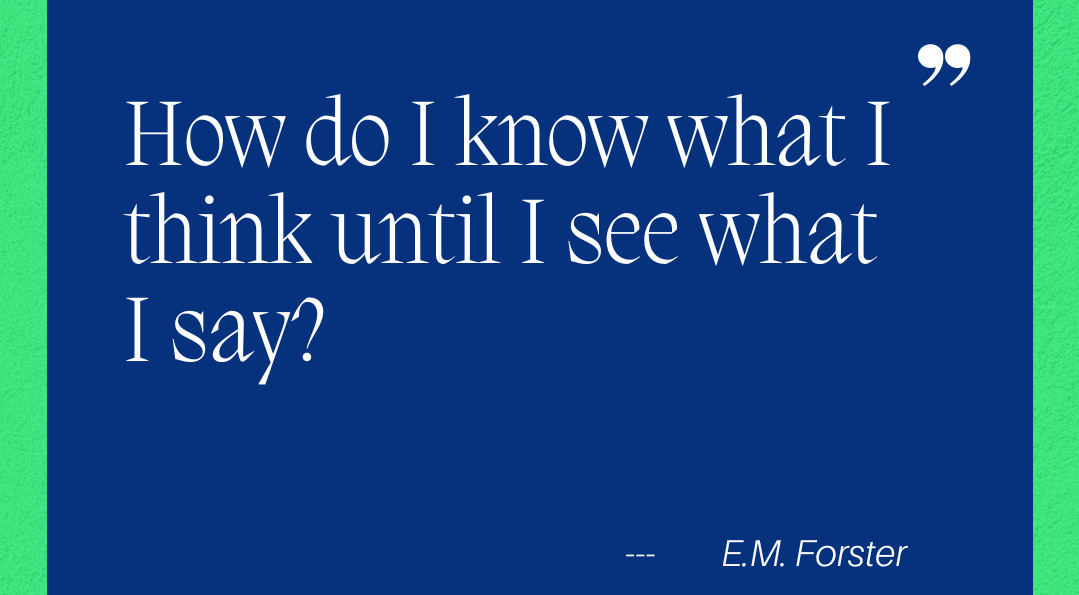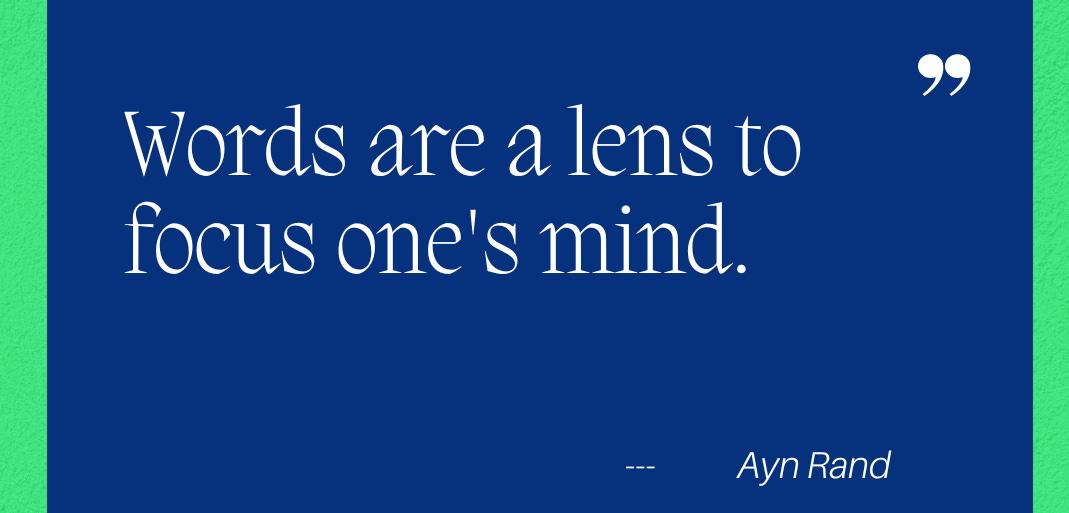Will Generative AI destroy our ability to think through writing?
What we can do to mitigate the downsides
Introduction
It seems the whole world is experimenting with Generative AI (GenAI). As with all new technologies, there are those who jump in with both feet, and those who resist with every step. Much is being written about the dangers of GenAI, especially in education. While I share the concern, the benefits are too plentiful to ignore. In this article, I'll explore why writing is a critical skill for thinking, how GenAI could disrupt that skill development, and provide actionable steps we can take to leverage the positives and mitigate the negatives for students, and for ourselves as adults.
Writing as Thinking
I learned to think through writing from my high school English teacher. At the beginning of the year, we each took a single subject spiral notebook. On the first page, we wrote 10 things we believed. She encouraged us to go broad, and bold, and personal.
Some subjects were frivolous, like - I believe The Eagles are better and more impactful to society than The Beatles. Some were controversial, like - I believe abortion should be legal. The only "rule" was that it should be a statement that not everyone would agree with. She gave us a week to build our lists. On the next Monday, we handed our notebook to the person next to us.
Throughout the year, we passed those notebooks around. You chose one of the statements, added it to the top of a new page, and then wrote your opposing viewpoint. You could keep a book for a day or a week, but they all got turned in on Friday and passed back out on Monday. It wasn't until everyone had written in every book that we received our own books back.
I have never looked forward to a class more than those Mondays. Most of the students in that class of 25 people were kids I'd grown up with. I'd known several of them since 2nd grade. Ten years together. But now I was seeing them in a whole different way.
The silent conversations and debates in these books taught us to see other people's viewpoints. When you read someone's opinion, alone and without social media, you can focus on what they are saying. You don't worry so much about how to respond or whether you agree. You simply read. And then respond in a more thoughtful and reflective manner.
I'm not sure what the teacher's intent was. She didn't grade the books. She never even commented on them. She just facilitated the process and made sure that everyone had a chance at every book.
I am sure what her impact was.
She strengthened our connections with one another.
She raised our empathy levels.
She taught us to listen.
She taught us to debate without animosity.
She taught us to write.
And writing taught us to think.
This process is called dialogue journaling (Denne-Bolton, 2013).
As an adult, you can replicate the process with friends, or even with GenAI. I keep an electronic notebook of interesting or aggravating articles and topics. I journal my thoughts on these ideas. Sometimes, I use that journal as the start of an article like this. If you want something more interactive and still private, use GenAI. Write your perspective, then ask GenAI for the counterpoint to your perspective.
How writing helps you think
Many authors have been quoted with some version of the same sentiment. They write to see what they think.
When I'm facing a particularly sticky problem, I often start to write.
What do I know about the problem?
What don't I know?
Would knowing that answer help with the solution? If so, how do I find the answer?
What would a great resolution look like?
Who else has a similar situation but not a similar problem, and can I get their opinions?
This process helps me see the problem better. I see new connections and possibilities that I couldn't see before. There have been many nights when I couldn't sleep until I got some problem out of my head and onto a piece of paper. Then I slept like a cat in a warm patch of sunshine.
Now I coach other leaders to use the same process. I find it especially helpful when they are struggling to define their vision in a compelling way. I encourage them to write their vision of the future. Not abstractly or in marketing language, but as a fictional scene from the future. What do meetings look and sound like? What kind of conflicts arise between which people, and how are they resolved?
Our brains have an amazing capability to execute what we envision. By writing out these kinds of scenes, you begin to bring your vision to life.
The official term for this process is "freewriting". (For more, ask your favorite GenAI tool for and explanation and some good resources. They are plentiful.)
The Calculator Corollary
Many people go to the calculator as an analogy for GenAI. When calculators first became prevalent, people worried about allowing them into the classroom. Many thought children would cease to learn the basic math skills. But have they?
I do think current generations have lost some math skills. But they may have gained others.
When I was young, my grandmother worked in a candy store. She taught me at an early age to count back change. If something costs $1.23, and a customer gives you $2, you give them 2 cents ("that's $1.25"), then 3 quarters (that's $2). Show anyone under 20 how to do that and they think you're magic, a real math wizard.
We also spent a lot of evenings watching TV while we sat on the floor and rolled change. We grouped different coins into 10s so it would be easy to get the correct number into the roll.
All this money counting taught us a certain kind of math in a very tangible and frequently repeated way. We understood fractions intuitively - 4 quarters in a dollar, 10 dimes in a dollar. We were very good at counting because we had to be.
Now, kids tap and swipe to transfer exact amounts. Some can no longer tell you how many dimes are in a dollar. They don't need to know, so they don't bother to learn.
Maybe that's good. After all, we have solved lots of math problems that went unsolved for centuries.
As an example, two students recently solved the Pythagorean Theorem with trigonometry. Something mathematicians hadn't been able to do for thousands of years. (CBS News 2023)
Maybe, just maybe, they were able to do this because they learned math differently. Maybe the way they learn math now is allowing different connections to be made more easily. Maybe their cognitive processes are genuinely different.
It is likely that GenAI will generate new cognitive processes. What we lose in writing capabilities may result in other skills that we don't even think about yet.
What to do about GenAI?
Rejecting GenAI altogether is a fool's game. We must move forward. The benefits are undoubtedly more beneficial than the consequences. However, we should be thoughtful of the potential consequences.
As ChatGPT (2024) says,
"Writing is more than stringing words together. It's about understanding your audience, structuring your thoughts, and conveying your message with clarity and impact." (OpenAI, 2024).
We need to recognize these skills as the key to writing. The purpose of writing is not to write, but to understand.
If we shift our thinking in that way, we begin to see GenAI differently. It can become a thought partner. A tool to help with the more mundane writing tasks, freeing us up for more complicated writing.
What teachers and parents can do
The obvious step: Don't give them busy work. I read a teacher lamenting that her students used GenAI for her regular "tell me about yourself" essay. She didn't understand why because it wasn't graded and she used them to help her understand what to teach. (Fritts 2024)
She gave them an assignment that didn't matter to them in any way and then was shocked that they used GenAI to finish it. If she intended to use the information to structure her class, did the class know that? Why would she need that information anyway, since she'd taught the class before?
We have to be more creative, more rational, and more communicative.
To help students learn with GenAI, we should provide expectations on what is and is not appropriate.
Tell them why. A great teacher isn't afraid of the question - "why do I need to know this".
Tell them how. They are going to use GenAI. Used well, they will learn more with it than without it. Tell them when and how you want them to use it, and what you don't want them to do. It could sound something like this:
We're learning xyz this semester. That will require you to struggle with some of these concepts. The struggle is just your brain trying to understand so don't feel bad if it doesn't all make sense right away. To help yourself, try writing down what you do understand. Then write out the questions you have. Often, writing those questions down will help you make the right connections. If you find yourself struggling still, write down a few possible GenAI prompts. Then go to GenAI to have a conversation. Ask for examples. Tell it what you already understand and ask for help.
Add an AI disclosure to your materials and require them to. All academic papers follow a certain set of rules. For example, all material used to build the paper must be cited, usually in a particular format like APA or MLA. The use of AI should be no different. At the end of each assignment, have an expectation of an AI "citation". APA explains how to cite GenAI tools. But as we learn how and when to use GenAI, having a separate section ensures more transparency. Something as simple as an explanation of when and how what AI tools were used. (See the end of this article for an example.)
Don't just tell them no. The best way to get anyone to do something is to tell them they can't. It won't work. It will just raise their stress and yours.
What we can do for ourselves
Before you open your GenAI tool, think about why you are using it. Is it something simple that needs a quick and efficient answer? Great. Go.
Or is it something you don't understand or want to learn more about? Proceed with caution. Open a blank document. Start with your own thoughts. Write down your own questions. Creating a good GenAI prompt requires you to structure your question well anyway. Use the opportunity to think "out loud". The process of thinking first and then researching is how you learn.
Conclusion
Just like long-unsolved math problems now being solved by a generation steeped in more complicated math education, having GenAI assist in our writing will open new capabilities. If we don’t have to write to know what we think, there may be upsides. We may be able to make different connections and create different cognitive processes that will allow us to solve new or long-unsolved problems.
It may take generations to see the impact, but there is no doubt. There will be an impact. It's up to us to find ways to mitigate the consequences and maximize the benefits.
Articles cited
CBS News. (2023, March 24). How two high school students solved a 2,000-year-old math puzzle. https://www.cbsnews.com/news/high-school-students-solve-pythagorean-theorem/
Denne-Bolton, S. (2013). The dialogue journal: A tool for building better writers1. English Teaching Forum, 51(2), 2-11.
Fritts, M. (2024, September 8). A teacher caught students using ChatGPT on their first assignment to introduce themselves. Her post about it started a debate. AOL. https://www.aol.com/news/teacher-caught-students-using-chatgpt-084102614.html
Open AI. (2024). ChatGPT 4.0 (Aug 2024 version) [Large language model] https://chat.openai.com/chat
AI disclosures
Reference research: I used Microsoft Copilot to generate citations for the articles referenced.
Quote research: I used Perplexity to uncover appropriate quotes.
Idea research: After the first draft, I used this prompt in ChatGPT 4.0 and Perplexity to see if there were other ideas I wanted to explore: I want to write a long post about a potential downside of AI growing. Write a post that explains how that tendency may diminish as people rely more and more on AI to write for them. I pulled the asterisked phrase in the article from one of those generated posts. Here is the context from that AI exchange:
*Conversation with ChatGPT 4.0 [Aug 2024]: The ability to write well is not just about stringing words together; it’s about understanding your audience, structuring your thoughts, and conveying your message with clarity and impact. These are skills that AI cannot fully replicate because they are deeply human.
No new ideas were surfaced, and no other direct verbiage was used.
Polishing: After the final draft, I used Hemingway.app to simplify or correct some of the wording used.




